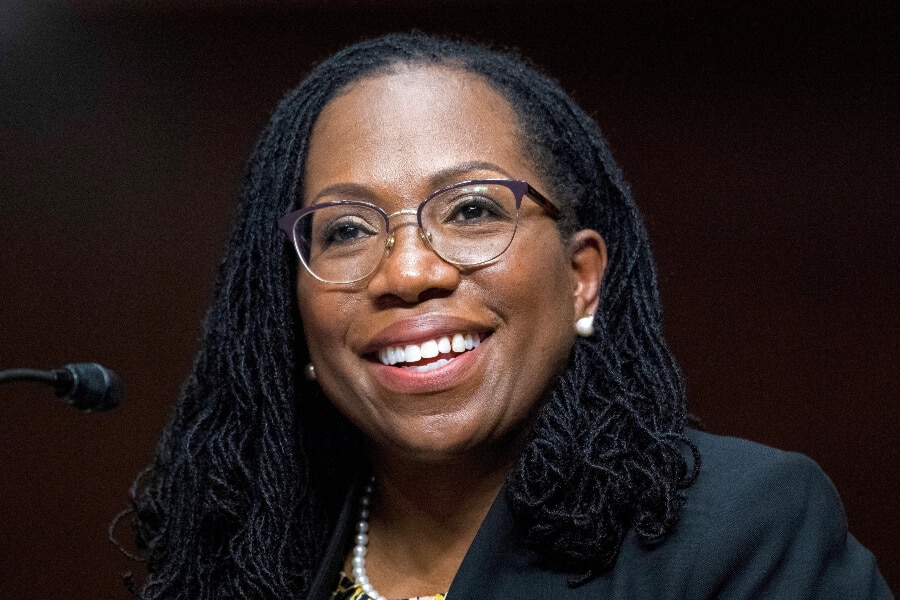By the time you read this, Ketanji Brown Jackson will likely have been confirmed as the 116th associate justice of the Supreme Court. Probably. Not even a year ago the Senate approved her confirmation to the DC Circuit Court of Appeals in a 53-44 bipartisan vote, but this year’s hearings have plenty of gotcha moments, including Senator Marshal Blackburn asking her to “define the term, `woman.’”
“KBJ” will probably be confirmed because even if no Republican votes for her, Vice President Harris will most assuredly be happy to break the tie.
How fitting that the Justice who is retiring, Stephen Breyer, would be replaced by one of his law clerks. And no matter what your politics are, it’s hard not to root for a woman, any woman who has clearly worked hard to achieve her goals.
Read More: What Women Need to Know About Amy Coney Barrett, Nominated to Replace RBG
The Peace Corps Origins
Politico reports that when Ketanji was born her aunt was based in Africa for the Peace Corps, she sent Ketanji’s parents, both public school teachers, a list of African baby names. They chose Ketanji Onyika, which means “lovely one.”
She will join Clarence Thomas as another justice who is in a long marriage that also happens to be interracial.
Born in the District of Columbia and raised in Miami, Ketanji attended Harvard University (where she met her husband, Dr. Patrick Jackson) and graduated from Harvard Law School in 1996. She will join Clarence Thomas as another justice who is in a long marriage that also happens to be interracial.
USA Today asked Karyn Lacy, author of Blue-Chip Black: Race, Class, and Status in the New Black Middle Class, about the significance of Jackson’s husband tearing up as he watched the hearing from behind his wife’s witness chair, and his “front-row seat” to his wife’s challenges in climbing the ladder in the legal profession.
“Most white men are not positioned to see the world from this vantage point,” Lacy said. “In that sense, Dr. Jackson’s tears reminded me of the tears I saw Black people shed, older Black people in particular, when Obama was first elected in 2008. It’s a recognition that while historically Black people have been denied the opportunity to reach their full potential, every now and then, there’s a breakthrough.”
Writing Obama
In February’s nomination announcement ceremony in the White House, Jackson directly addressed her two daughters, Talia and Leila. “You are the light of my life. Please know that whatever title I may hold or whatever job I may have, I will still be your mom. That will never change.”
Black women have always had the highest levels of labor market participation.
At the same event, Jackson read a letter Leila wrote to Barack Obama when she was just 11 years old. Justice Scalia had died, and Leila wanted the president to know that her mother would be a worthy nominee to replace him. “Dear Mr. President, while you are considering judges to fill Justice Scalia’s seat on the Supreme Court, I would like to add my mother Ketanji Brown Jackson of the district court to the list,”
Researchers who have studied the effects of gender and racial bias in the workplace have found that upper- and middle-class Black women are less likely to hop off the career track when they have children. The Economic Policy Institute reports that “compared with other women in the United States, Black women have always had the highest levels of labor market participation regardless of age, marital status, or presence of children at home.”
The Balance Game
Like her predecessor Ruth Bader Ginsburg, affectionately known as RBG, Jackson–who I like to think of as KBJ–had to find a work life balance as she pursued a career that took her to the most esteemed appointment a lawyer could ever dream of, and she has publicly admitted that sometimes she got the balance wrong.
She is widely known as a consensus-builder.
While RBG was an activist judge who took a firm stand on women’s and workers’ rights, it remains to be seen how KBJ will rule on controversial issues before the court. She is widely known as a consensus-builder, and as both a former public defender and the niece of the Miami Chief of Police, she has been imbued with a sense of justice for all sides.
In an era when political parties have become more and more entrenched in their positions, and the Chief Justice has sometimes sided with the Court’s liberal justices, Jackson’s opinions will be consequential. But no matter how she votes, her confirmation breaks one more barrier to race and gender equality.
Read More: “When I Look Up, All I See is Sky:” Losing RBG and a Generation
***
Jeannie Edmunds is the author of Start Me Up: Tips, Tales and Truths about Starting Up and Starting Over and the chief operating officer of NextTribe.





















0 Comments